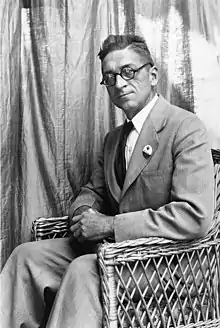William Mansfield Clark
William Mansfield Clark (17 August 1884 – 19 January 1964) was an American chemist and professor at the Johns Hopkins University. He studied oxidation-reduction reactions and was a pioneer of medical biochemistry.

Clark was born in Tivoli, New York, in a clergy family and studied at Hotchkiss School and Williams College before entering Johns Hopkins University, where he received a PhD in chemistry under H.N. Morse with a dissertation on A contribution to the investigation of the temperature coefficient of osmotic pressure: a redetermination of the osmotic pressures of cane sugar at 20°. He then worked on dairy bacteriology in the US department of agriculture followed by studies on oxidation reduction of dyes and metalloporphyrins at the Hygiene Laboratory, which he headed from 1920. He joined the Johns Hopkins Medical School as a professor of physiological chemistry in 1927.[1]
References
- Wood, W. Barry (1964-04-01). "William Mansfield Clark 1884–1964". Journal of Bacteriology. 87 (4): 751–754. doi:10.1128/JB.87.4.751-754.1964. ISSN 0021-9193. PMC 277088. PMID 14139526.